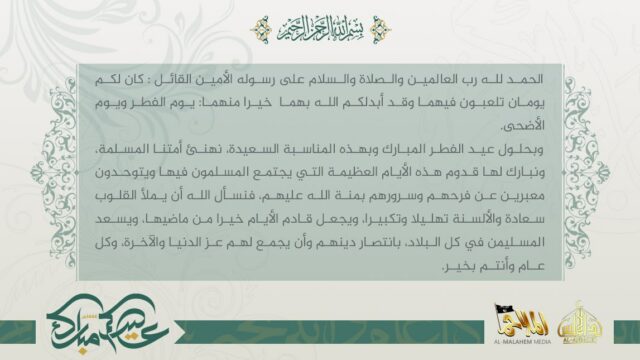
Brief: Al-Qaeda Affiliates AQIM and AQAP Show Unity with Eid Statement
Publication: Terrorism Monitor Volume: 21 Issue: 9
By:

Historically, al-Qaeda in the Islamic Maghreb (AQIM) and al-Qaeda in the Arabian Peninsula (AQAP) were among the most effective al-Qaeda affiliates globally. After announcing its formation and affiliation with al-Qaeda in 2007, AQIM conducted frequent suicide bombings and ambushes of Algerian security forces, while AQAP conducted high-profile attempts at striking the US homeland, including through the “underwear bombing” plot in which a Nigerian trainee failed to detonate an explosive on a US-bound flight (aljazeera.com, October 12, 2011). AQIM and its allies were able to maintain control over parts of northern Mali in 2012, until a French-led military intervention dispersed them in 2013. AQAP managed to hold onto territory in Yemen until UAE-backed troops ousted the jihadists from Mukalla in 2017.
Most recently, on April 24, the two groups released an Eid al-Fitr message together (Twitter.com/@azelin, April 24). Although it was generic and essentially only wished Muslims a “blessed year,” it harkened back to a time when these two groups were in their heyday and enjoyed a “special relationship.” For example, after the Nigerian government cracked down on Boko Haram and killed its then-leader Muhammed Yusuf and several hundred of his followers in 2009, AQIM and AQAP both issued similar statements of condolences (in video and print form, respectively) to the group and condemned Nigeria’s government (al-Malahim, February 17, 2011).
Later, in 2014, AQIM and AQAP officials both issued statements critical of Islamic State (IS) when Abubakar al-Bakhdadi declared a caliphate. At first, however, they did not advocate for hostilities against IS; al-Qaeda was eventually forced to confront IS when it became dominant in Syria and Iraq (al-Andalus, December 27, 2014). AQAP and AQIM had also issued a joint statement prior to that to call on all jihadist groups in Syria and Iraq to remain united and avoid fighting amongst one another. This was indicative of the extent to which the groups synchronized their public narratives (jpost.com, September 16, 2014).
AQIM and AQAP’s unity of messaging also extended to private correspondences, such as when AQIM advised its offshoot, Movement for Unity and Jihad in West Africa (MUJWA), to slowly implement sharia in northern Mali when the jihadists occupied the region in 2012. This was strategically intended to not alienate Muslim civilians who had become “ignorant” of sharia due to decades of living under secular rulers. Critically, the advice was provided from AQAP to AQIM and then passed on to MUJWA, demonstrating a particularly close relationship between the two al-Qaeda affiliates (Associated Press, April 26, 2012).
The purpose of the latest joint statement on Eid is likely to attempt to reinvigorate AQIM and AQAP’s relationship, which has decayed since the death of Aymen al-Zawahiri. Al-Qaeda has been without a leader for almost a year, and needs its affiliates and their operatives to boost its profile among the global jihadist groups. The joint statement is intended to dispel any sentiments about al-Qaeda being obsolete or on the decline, reaffirming that the two al-Qaeda affiliates remain just as jointly committed the jihadist struggle now as they were when they first joined al-Qaeda 15 years ago.



